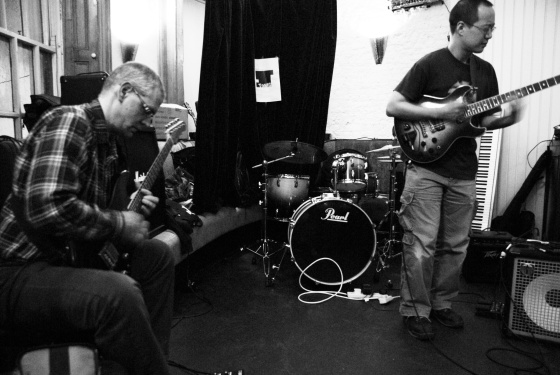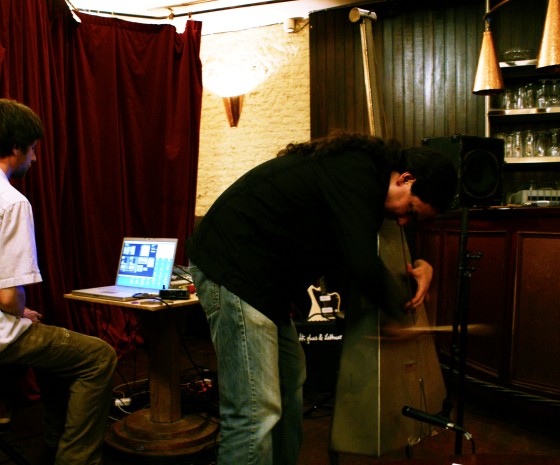I debated this, not for a long time, but I nonetheless tossed around the idea before leaving my volume pedal at home. I really felt I needed to physically part with the volume pedal rather than simply disconnecting it from the signal chain, and since the it’s grafted onto the footstool, I’d require some other means to anchor the guitar against my belly.
I grabbed my very old, slightly damp-damaged guitar strap off the wall and headed out the door.
It may be as much as fifteen years since I performed standing up with the guitar (and the last time may have been for a game piece by Pedro Rebelo that required a degree of physical and theatrical mobility).
I expected the experience to be physically and psychologically… odd, but I wasn’t prepared for the oddness of keeping my boots on.
And, hey, I never realized how (socio-musically) useful it is to be able to move fro and back as you signal the move from foreground to background.
I figured if I couldn’t carry the 15–20 minutes I’d be playing in the relatively safe space of the Lab without the usual resources (of variable volume envelopes, of the familiar posture), I’d be in trouble playing with the old-timers at OTO. I needed to know….
So I’m up there with John Godfrey: I’ve heard him play over the years, of course, but this was our first on-stage meetings, and I wanted this to be different—to provoke a different kind of music.
And without my usual resources, the volume pedal in particular, I’d figured it would be relatively easy to contrast with John’s highly technically mediated sound (‘sound,’ again, in the afrological sense).
I wanted the performers (myself and John) to work. In a similar maneuver to the encounter with Evan Dorrian, I wanted to create a context in which we’d have to exert effort, to labor; to push him, and, hopefully, to be pushed and pulled in return.
From a curatorial standpoint, however, a problem with this approach is that, as the Lab progresses though the evening, and as many more people engage on-stage (which is a good thing), there’s often gradual downward slope in terms of densities, complexities and energy levels. The format in which the relatively experienced improvisers do their shtick early on during the evening was a created in response to comments from audience members that they desired to witness “how it should (or could) be done” before the relative rookies took to the stage.
But that energy dip….
As curator and club-runner, how might I solve this problem without wrecking the Stet Lab mission? Is it a problem?
Talking to Owen Sutton (drummer) and Tony O’Connor (bass player) after the five (count ’em) guitar ensemble that closed the Lab, I remarked that one of the complications (and one that I worried about prior to the guitar quintet’s performance ten minutes to venue close) stemmed from guitarists generally have bad braking times.
We’re not like our true rhythm section brethren (drummers, bass players, etc.) or our frontline counterparts (horn players, fiddler, vocalists). A braking latency is a trait we share with other idiomatically polyphonic instrumentalists (keyboard players, pianists). Many of us came from the bedroom and can too easily get lost in our little worlds; solipsistic and oblivious to anything but the neat stuff flowing from under our fingers. [Seriously, listen to the track and count how many times you think this happens.]
During the quintet Kevin Terry deploys a moment of near-verbatim quotation. It’s funny and it’s effective.
Sometime later (for me significantly later in the context of this ditty), Enda Buckley also throws one in.
I’m reminded of one student who would, with impeccable timing, while the rest of the ensemble were doing the Make-A-New-Music-Noise-Here routine, would throw in a beautiful open DΔ chord on his guitar at exactly the wrong (thus entirely right) time. It would send the self-fashioned New Music Ensemble reeling from the comfort of its plink-plonks, bloop-bleeps and scratch-crashes.
Fantastic!
This is what Cage never understood. For the Cagian doctrine, all sounds can be sounds as long as it had (ostensibly, and according to culturally and ideologically (and racially) specific criteria) was ‘free’ of history and context. What Cage (and his followers) were barricading themselves from was not convention, but power—the power to disrupt their cozy, easy liberalism.
But that’s a story for some other time….
The pleasure / utility / power of a quote is to throw a big fat spanner into the working of group improvisation.
The drawback / hazard / weakness of a quote can be summed up by the question: now what?
A single quote (as opposed to an explicitly and contiguously idiomatic performance, or a scatter-brained collage of channel-hopping) can have interesting and problematic consequences for interaction. The effectiveness of the quote—to be able to collapse and redirect and improvisation—is also what makes them hard to deal with. Now what? Given that this quote redefined and reconstructed the performance up to this point, now what? I wonder what consequences Kevin and, in particular, Enda were expecting?

